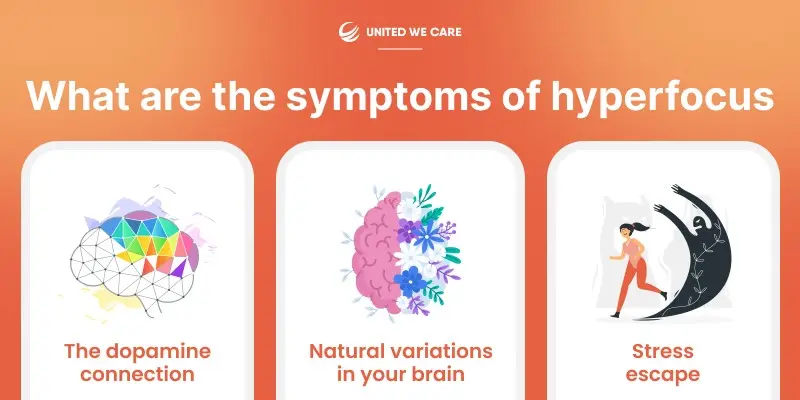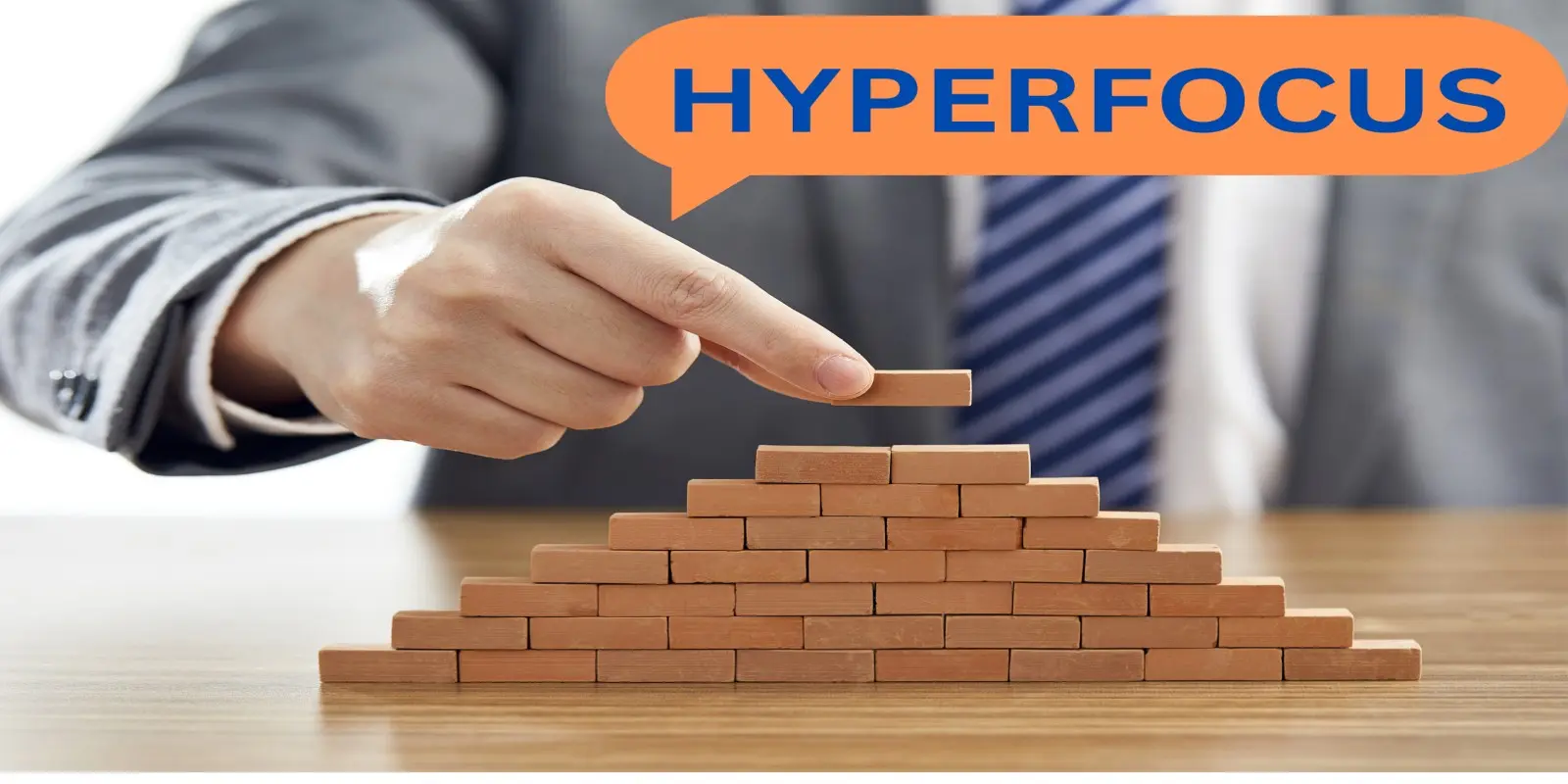Introduction
Have you ever felt like the world around you faded away as you engaged in an activity that you’re really interested in? This is a state of hyperfocus, and it’s an occasional feeling that many of us can relate to.
Hyperfocus is also closely associated with the state of flow. Both these experiences are similar in terms of how intensely you can focus on the activity and the transformation of your sense of time.
However, they’re not the same. When you’re in a state of flow, you have a sense of control over the activity such that you are able to move on from it as needed. Whereas when you’re hyperfocused, you might get so sucked up into the activity that you have a really hard time putting it aside and paying attention to something else.
Think of it like this: While the state of flow can feel balanced, hyperfocus can feel like losing it.
Must Read- Hyperfixation vs Hyperfocus
What Is Hyperfocus?
When you are in a state of hyperfocus, you focus the majority of your thoughts, time, and energy on engaging in a singular activity of interest.[1] This doesn’t sound so bad until you have a problem regulating your attention to other important tasks.
You might feel positive and fulfilled at first, but ultimately, the fixation and stress start weighing you down. You start neglecting your work, social commitments, and even caring for yourself. You lose chunks of your time and become too detached from your surroundings for your own good. This imbalance can affect your overall health and well-being in a negative way.
For instance, when you’re hyperfocused on work, you might inadvertently delay meals or miss getting back to people. This can eventually make you feel burnt out and even lonely.
Hyperfocus can also look like:
- Not being able to recollect where your time went once you come out of your focused state [2]
- Not hearing the people around you or even noticing a thunderstorm outside
- Having strained relationships and difficulties at work because you didn’t meet your targets
- Not showing up socially and then feeling lonely because you are mostly preoccupied with your activity
- Feeling physically exhausted because you’re stressed and not able to eat or sleep properly
The negative effects of hyperfocus intensify when your activity of focus in itself is not productive or serving you in any way, such as playing video games, scrolling on social media, or shopping online.
What Are The Symptoms Of Hyperfocus?
Hyperfocus is influenced by a combination of neurobiological, environmental, and psychological factors, such as:

- The dopamine connection: The activity of your interest tends to be perceived as rewarding by your brain, stimulating the release of dopamine. This can lead to you engaging in your activity repeatedly and with more focus, which in turn releases more dopamine. Over time, the activity might become habitual and even compulsive.[3]
- Natural variations in your brain: Hyperfocus is commonly associated with ADHD because it can make you struggle to regulate your attention. People on the autism spectrum can also intensely experience this while engaging in their special interests.
- Stress escape: You may be simply trying to escape from life’s stressors by coping with hyperfixating on something else that wouldn’t bother you.
Additionally, the excessive use of specific types of technology is linked to the development of hyperfocus-like behaviors. The design of social media platforms and internet content aims to maximize our engagement and stimulate the release of dopamine. Activities on the internet often promote task switching as opposed to true multitasking, which can reduce our overall efficiency and progress.
How Long Does Hyperfocus Last?
The duration of hyperfocus can vary from person to person. For some, it could be a few minutes, while for others, it could last for several hours at a stretch. Your hyperfocus may be prolonged if:
- You’re engaged in a task that’s really rewarding for you because of how aligned it is with your interests.
- You have ADHD or are on the autism spectrum
- You have a comfortable environment with absolutely no distractions
- You’re well-rested with your physiological needs fulfilled, which allows you to focus uninterruptedly
Unlike the state of flow, being hyperfocused for too long can make us feel burnt out. You may experience negative effects such as:
- Eye strain, muscle stiffness, and stress injuries from not taking breaks for too long
- Dehydration and hunger if you forget to eat and drink water in time
- Reduced sleep duration and quality if you work too late in the night
- Feeling anxious about the consequences of not paying enough attention to other important tasks
However, you can learn to manage the negative effects of hyperfocus.
Read more about – ADHD Hyperfocus
6 Important Tips to Cope With Hyperfocus?
Hyperfocus can lead to physical and mental distress and neglect of other responsibilities.
- You can manage your hyperfocus by first recognizing what hyperfocus looks like for you, what happens to you when you enter that zone, and if you’d like to continue or redirect your attention to something else.
- If you continue into the state of hyperfocus, you can keep a tab on the time you spend in it. You can designate specific amounts of time for tasks and use an alarm to keep yourself in check.[4] Don’t forget to schedule enough break time to stretch and refresh.
- Try being more intentional with the task you’re doing. You can outline your goals and prioritize them to stay on track and be accountable for the progress you make.
- You can also make it a practice to meditate or engage with your breath during your breaks or at any point in your day. This can help you be mindful of how you’re feeling.
- Sharing your hyperfocus struggles with a close one can make you feel supported. You can also share it with a therapist who can help you with tools and strategies to overcome it.
- If you’re prone to hyperfocus, you may want to monitor your caffeine intake, especially later in the day. Ultimately, taking good care of yourself with regular sleep, a balanced diet, exercise, and rest can help healthily regulate your focus.
Conclusion
Being hyperfocused can make the world around us fade away as we engage in a single activity of our interest. While it can be a positive experience at first, it can quickly derail our mental and physical wellbeing.
Suddenly, you might not be able to recollect where your time went, not hear the people around you, neglect other responsibilities, isolate yourself socially, and feel physically exhausted.
Neurobiological, environmental, and psychological factors cause hyperfocus. Your hyperfocus may be prolonged if you’re really passionate about the task, are neurodivergent, have no distractions around you, or are just looking to escape other stresses. It is possible to manage the negative effects of hyperfocus by being aware and more intentional about your tasks and seeking professional health and the support of your loved ones.
You can seek help from experts at United We Care. Our team of wellness and mental health experts can guide you through the best methods for your well-being.
References:
[1] Ashinoff, B.K., Abu-Akel, A. Hyperfocus: the forgotten frontier of attention. Psychological Research 85, 1–19 (2021). https://doi.org/10.1007/s00426-019-01245-8
[2] Hupfeld, K.E., Abagis, T.R. & Shah, P. Living “in the zone”: hyperfocus in adult ADHD. ADHD Atten Def Hyp Disord 11, 191–208 (2019). https://doi.org/10.1007/s12402-018-0272-y
[3] R. Nicholson, “Hyperfocus in autism: An exploration inspired by the principles of neurodiversity,” Dissertation, Immaculata University, 2022. [Online]. Available: https://library.immaculata.edu/Dissertation/Psych/Psyd458NicholsonR2022.pdf[4] Erguvan Tugba Ozel-Kizil, Ahmet Kokurcan, Umut Mert Aksoy, Bilgen Bicer Kanat, Direnc Sakarya, Gulbahar Bastug, Burcin Colak, Umut Altunoz, Sevinc Kirici, Hatice Demirbas, Bedriye Oncu, “Hyperfocusing as a dimension of adult attention deficit hyperactivity disorder”, Research in Developmental Disabilities, Volume 59, 2016, https://doi.org/10.1016/j.ridd.2016.09.016










